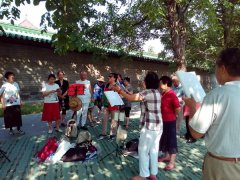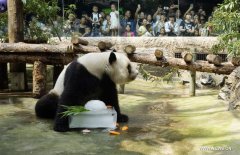Feature: A Chinese pastoral
URUMQI, April 19 (Xinhua) -- Birth and death walk side by side among Dilai's flock. That's just the way things are on the Xinjiang grassland.
It's already April, but the Bayan Bulag grassland has yet to show any sign of spring. The sun absent, Dilai and his family have seen nothing but dark clouds and snowflakes for three days. Pregnant ewes paw at the snow-frosted ground, looking for grass while newborn lambs shiver in the wind.
Bad weather during lambing season is the last thing any herdsman wishes for.
The herdsmen still preserve the traditions of grazing and migrating on the Bayan Bulag grassland, northwest China's Xinjiang Uygur Autonomous Region.
Dilai, 50, has been a shepherd on the fertile grassland for decades. The flock of 200 sheep he inherited from his father has expanded to 1,000,but this year the weather has shown no mercy. The snow and cold has killed more than 5,000 livestock on the Bayan Bulag in April alone.
In bleak conditions, Dilai and his family are doing their best while preparing for the worst.
Every day, Dilai and his eldest son Dovton inspect the flock while on horseback. Dilai's nephew Qimti Cering, who comes along with his wife to help, watches any newborns that have been abandoned by their mothers.
Things can be cruel here. A lamb struggles to its feet and scrambles to its mother, only for her to give an angry bleat and dodge her newborn. The lamb approaches again, before being violently kicked by its irritated mother.
The ewe snorts and runs away, leaving her newborn in fear and trembling. It is the fourth time the lamb has been rejected by its mother.
Coldness and hunger halt the ewes' mothering instincts. Many first-time mothers are not able to take care of their newborns. Loving shepherds are needed to help the abandoned lambs.
The shepherds hold or bind the front legs of the mothers so that the lambs can suckle. Mothers that continually reject their newborns, have them tied to their legs.
The shepherds watch their flock by night and become anxious. Dozens of lambs are expected to be delivered overnight. Without timely care, the new arrivals will die soon after birth.
Dilai and Qimti are on the night watch and have to spend it in an open enclosure without heating and nothing but a small torch for light. For a month, they have to spend their nights in the enclosure, keeping an eye on the pregnant sheep, preventing them from running away or giving labor elsewhere. Dilai's eyes are bloodshot after little sleep.
"The family's income depends on the new lambs, so taking good care of them is most important, even if we don't eat or sleep," says Dilai.
Wrapped in a quilt, he huddles up beside the enclosure, waiting, listening.
Dilai's wife Tuya prepares supper at 11:00 p.m. It is the family's only chance to get together after a hard day's work.
It is not the first storm that Dilai lived through, but he never thought of leaving. The rhythms of the grassland are in his blood.
Tuya remembers that they only had a yurt, a bed and an offering table when they were married. But their work over the years has paid off. Now their children have houses and cars in the town.
Apart from 10,000 yuan (about 1,400 U.S. dollars) subsidized by the government annually, Dilai earns 300,000 yuan from the grazing.
"I am a shepherd. Herding on the grassland is all my life," Dilai says. "I won't leave my flock until I'm too old to walk or ride my horse"
Dovton, 26, decided to stay with his parents after he graduated from high school. He is the eldest son and it is his obligation to take on his father's career so that his two younger brothers have the chance to see the outside world.
"My parents can't leave their flock. They have to take care of the animals by themselves, and I want to take care of them. That's why I stay," he says.
Overlooking his flock and home on a nearby slope, Dovton says he had good grades at school and would have gone to college if it were not for his parents.
As the night ticks away, another dozen lambs are born. Most are healthy, though a few are in critical condition.
One lamb is too weak to open its mouth. It lies motionless as a shepherd herdsman tries to poor milk into its mouth.
For over half an hour, Qimti tries help the lamb, but it's breath becomes weaker and weaker. Nearby, vultures and crows circle overhead.
Finally, the lamb fails to make it. Death wins.
A new day arrives, though the sun has not come out and snowflakes continue to effortlessly float in the air.
Whatever the weather on the Xinjiang grasslands, the shepherds continue to watch their flock and the unending cycle of birth and death.















